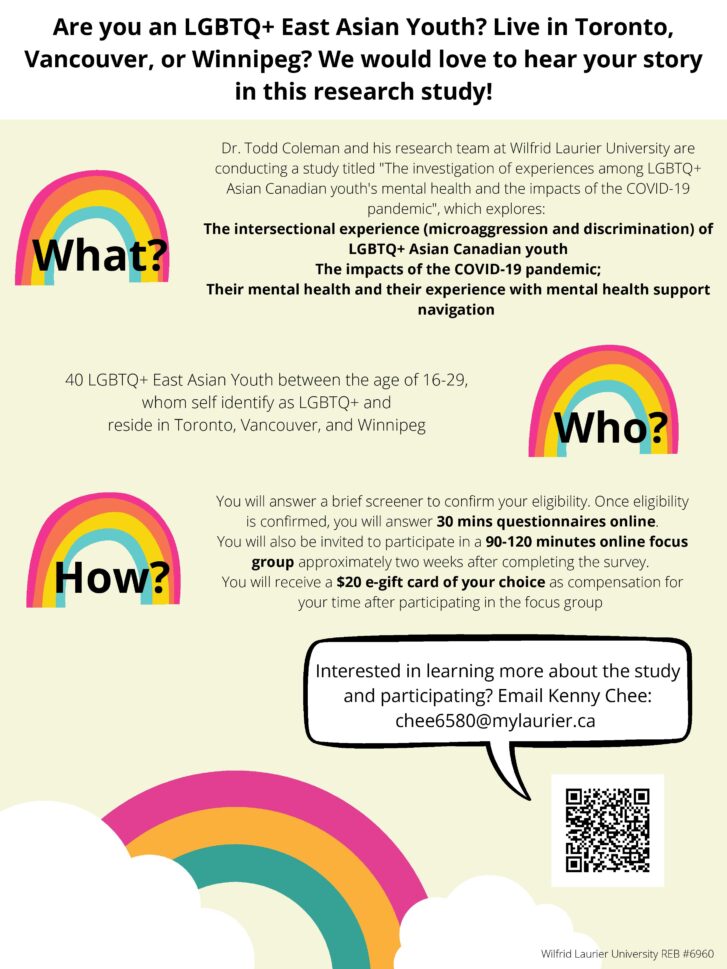RESEARCHER BIOS AND HOW THEIR RESEARCH BACKGROUNDS RELATE TO THIS STUDY
Dr. Todd Coleman (he/him) is an assistant professor at the Department of Health Science at Wilfrid Laurier University. His research area is in population health and research methods. He works with various community organizations to conduct research on the health outcomes of 2SLGBTQIA+ populations, including HIV and other sexually transmitted infections.
Kenny Chee (he/they) is currently a Master’s student in the Community Psychology program at Wilfrid Laurier University under the supervision of Dr. Todd Coleman. Kenny’s overarching research interests are in the health of 2SLGBTQIA+ youth. This study is Kenny’s Master’s thesis project.

PURPOSE OF THIS RESEARCH PROJECT
LGBTQIA+ Asian youth face unique challenges due to racialized discrimination and microaggression (e.g., sexual racism, exotification, fetishization) within the 2SLGBTQIA+ communities and queered heterosexism within the Asian communities, as being LGBTQIA+ is highly stigmatized in Asian culture. The exclusion from both communities leads to detrimental mental health outcomes among the LGBTQIA+ Asian youth. The COVID-19 pandemic exacerbated the challenges faced by the LGBTQIA+ Asian youth, such as witnessing increased hate crimes against the Asian communities and experiencing feelings of isolation due to the public health restrictions. Although supports have been made available for the Asian communities and LGBTQIA+ communities during the time of crisis, LGBTQIA+ Asian youth might not feel comfortable sharing the same space with either community due to the racialized racism and cultural stigmas associated with LGBTQIA+ identities.
We will use a mixed-methods approach (i.e., questionnaire and focus group interview) to examine this phenomenon. The youth will share their experiences on the impacts of the pandemic, the intersectional discrimination and microaggression they experience, and how they navigate their mental health support system. Overall, the purposes of the study are to (a) examine the ongoing challenges experienced by LGBTQIA+ Asian youth exacerbated by the COVID-19 pandemic; (b) recentering LGBTQIA+ Asian youth’s narratives; (c) to inform the community organizations of the needs of a more inclusive mental health support for LGBTQIA+ Asian youth. To date, there is a lack of research on the intersectional experience among LGBTQIA+ Asian youth, especially in the Canadian context. Thus, this study is to fill in the gap in the LGBTQIA+ and Asian literature.

HOW THIS RESEARCH WILL HELP LGBT2SQ PEOPLE AND COMMUNITIES
Although supports have been widely available for 2SLGBTQIA+ people and communities, the sexual racism, fetishization/exotification and microaggression in the 2SLGBTQIA+ communities experienced by LGBTQIA+ Asians created barriers for them accessing support. Thus, this research is to highlight the challenges faced by the LGBTQIA+ Asian youth through their narratives and to inform the community organizations of the importance of a more inclusive environment and support for LGBTQIA+ Asian youth, especially when the collective mental health among the Asian communities is negatively impacted by the intensified racism and hate crimes associated with the COVID-19 pandemic.
PARTICIPANTS
LGBTQIA+ Asian youth between the age of 16 to 29 who reside in Toronto, Winnipeg, or Vancouver can participate in the study.
COMPENSATION
Participants will participate in two parts of the study. The first part is a 30 mins questionnaire, and the second part is a 90-120 minutes focus group with three to four peers.
Participants will be compensated with a $20 e-gift card of their choice (Amazon, Tim Hortons, Starbucks) only after participating in the focus group.
MITIGATION MEASURES
The letter of information and consent form explicitly outline the potential risks to participants as they will share their experiences in different topics (e.g., experiences of discrimination). Participants will be able to make an informed decision whether they want to participate in the research based on the information provided on the consent form. Participants will also be informed that they can skip or refuse to answer any questions they are not comfortable with during the focus group interview. Moreover, a list of resources (e.g., crisis hotline) will be provided to participants in case they experience distress after the study.
PROMOTING THE STUDY
We will promote the study online (e.g., Facebook, Twitter, Instagram) by using recruitment posters through different agencies in different regions. The study will also be promoted online (e.g., Instagram) through sharing through circles of networks (e.g., from friends to friends). This study will also be promoted on Reddits, including the subreddits of Toronto (r/toronto).
Recruitment-Poster-2.0Article From: rainbowhealthontario.ca

